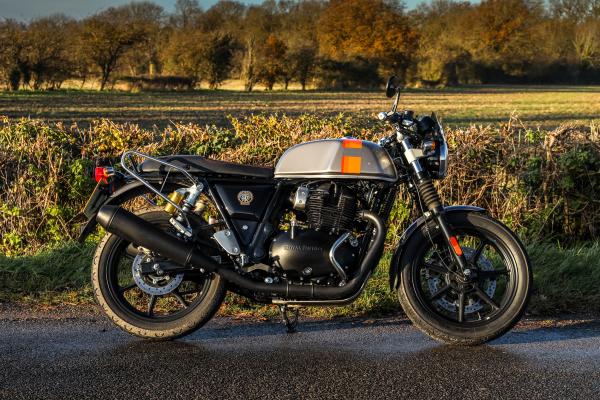
The Continental GT brings with it café racer looks for far less than other options from British-based brands, but there are areas in which you get what you pay for
The heydays of the ton-up boys blasting down London’s North Circular were before most current bikers were even born, and yet, there remains a certain allure to the café racer. This style of bike is one of the most popular routes to take when making a custom machine, but what if you wanted a brand new bike with a warranty and modern considerations like ABS, and a decent chance of it actually starting up in the morning?
On that front, if we’re talking about proper café racers with a single seat, clip-ons, the right style of fuel tank and old-school looks, your options are surprisingly limited. A few special edition café racers have been and gone in recent years, and the Triumph Thruxton will soon bow out. And in any case, at £15k for the Final Edition, it’s not the most accessible thing.
Then again, it’s at least cheaper than the Norton 961 Commando Café Racer, which weighs in at an even punchier £16,999. Happily, there’s a third possibility which will raid a good £10k less from your piggy bank - the Royal Enfield Continental GT650.
Pricing, availability and colours
The Continental GT650 starts from a very tempting £6,599. Unlike many brand-new motorbikes, where you’re lucky if you only get three paint choices, only one of which isn’t monochromatic, the Conti GT is available in no less than six different hues.
Your choice dictates the price, with the £6,599 entry price covering British Racing Green and Rocker Red. For £6,799 you can pick between Apex Grey, Dux Deluxe (white and green) or Slipstream Blue, while splashing out £7,099 secures you Mr Clean, which features a gorgeous polished, naked metal tank.
Engine, frame, chassis and technology
The genetic makeup of the Royal Enfield Continental GT650 is very similar to that of the Interceptor 650. The main differences lie in the styling and the clip-on handlebars that give a more focused, leant-forward position.
Both bikes use steel tubular double cradle frames, into which is slotted an air-cooled 648cc parallel twin using that very much in-vogue 270-degree crankshaft configuration for a more burbly, V-twin-like character. It produces 47bhp, making it A2 licence-friendly without the need to restrict it, plus a healthy 38lb ft of torque.
The GT650 is a disarmingly simple bike. It uses a cable-actuated throttle, so there are no rider modes, nor is there traction control. Or even a clock. The simple LCD positioned under the analogue speedometer (the rev counter is of the old-school kind, too) does at least give a fuel read-out, along with the odometer and trip computer information.
There’s ABS, as is now mandated - the GT gets a dual-channel setup. Otherwise, about as complicated as it gets is a USB-A socket located near the clocks, making it a lot easier to charge your smartphone than with the oft-used under-seat location.
Braking is taken care of via a 320mm single front disc squeezed by a twin-piston calliper and a 240mm rear disc acted on by a single-piston sliding calliper. The suspension setup features a non-adjustable, right-way up (as opposed to upside-down) 41mm telescopic fork and preload-adjustable twin rear shock with ‘piggyback’ external reservoirs.
Wire wheels might have hammered home the Continental GT’s retro aesthetic further, but the black-painted 18-inch cast wheels front and rear don’t look out of place. They're wrapped in relatively lithe 100/90 front and 130/70 rear Pirelli Phantom Sportscomp tyres.
What it’s like to ride
The Continental GT 650 is a bike you can enjoy before you even swing a leg over - it looks gorgeous. That coffin tank sets the bike off really nicely, especially in the Apex Grey with its orange striping, as tested (although it would have been nice to have the seat trim in the same colour, instead of black). The clip-ons complete the look, making for a bike that seems purposeful.
While it might look, on the face of it, a bit like a Triumph Thruxton for not much more than a third of the price, you only need to ride down the road a few hundred metres to see why the bike costs so much less. First of all, the cockpit doesn’t exactly scream ‘premium’, with a fairly chunky-looking triple clamp (though the embossed Royal Enfield logo is a nice touch), and beefy metal switch cubes that counter-intuitively look and feel a bit cheap compared to the usual plastic parts.
Where the GT really reflects its lower price, though, is in the suspension. It might look snazzy enough with the gold-finished piggyback reservoirs giving off a certain faux Öhlins look, but there’s not a lot of sophistication here. The Continental GT is set up softly and seems to wallow into its travel over undulating road surfaces, meaning there’s only so far you’ll feel comfortable pushing it on a country road.
The brakes don’t help in this regard, either. In terms of stopping power, they’re just about adequate, but they feel spongy - a common theme with Royal Enfield bikes.
That being said, the more leant-forward position brought about by clip-on bars means there’s a decent amount of weight over the front wheel, bringing back some of the confidence lost by the slightly soggy damping and also the tyres, which feel merely okay when you’re leant over. The handling on the whole is a little on the lazy side, but it tips in with enough enthusiasm if subjected to more assertive inputs.
Next to the looks, the engine might just be the Conti GT’s strongest suit. It’s not anything like as revvy as a lot of the 270-degree crank twins out there, making peak power at 7,250rpm (Aprilia’s new RS457 deploys its full output at the heady heights of 9,400rpm), but that’s in keeping with the bike’s character.
It makes a lovely rumbly noise, and pulls keenly through the mid-range, helped by the reasonably meaty torque figure. Changing gear is taken care of via a slick-shifting six-speed gearbox - a step up from the old single-cylinder Continental GT which made do with only five ratios.
The thing is, it doesn’t feel all that fast compared to many bikes making around the A2 licence limit. The Honda CB500 Hornet undercuts it by 35kg, and the recently updated Husqvarna Svartpilen 401 by a whopping 60kg.
Should you buy a Royal Enfield Continental GT 650?
With all this in mind, then, the Continental GT 650 isn’t the sort of bike you buy for serious country road carving. Nor is it something that’s particularly well suited for touring or longer commutes, even if fitted with the very useful soft panniers our test example was equipped with.
While the clip-ons have risers, reducing wrist strain and how far forward you’re leant, the riding position can get tiring on a longer trip. Plus, you won’t go very far between fuel stops thanks to a modest 12.5-litre fuel tank capacity and the official 70mpg fuel economy figure being a bit optimistic, judging by our testing.
What it’s ideal for is shorter jaunts where you’re just happy to be out and about, enjoying that burbling twin and the outside world, and less worried about how fast you’re going or how far you’re tipping the bike into corners. For a Sunday morning potter to blow away the cobwebs and improve your mood, it’s ideal.
And the good news is, if you’re not properly sold on the looks and/or don’t fancy the riding position, you can get a very similar and more comfortable take on the same ingredients with the Interceptor.

